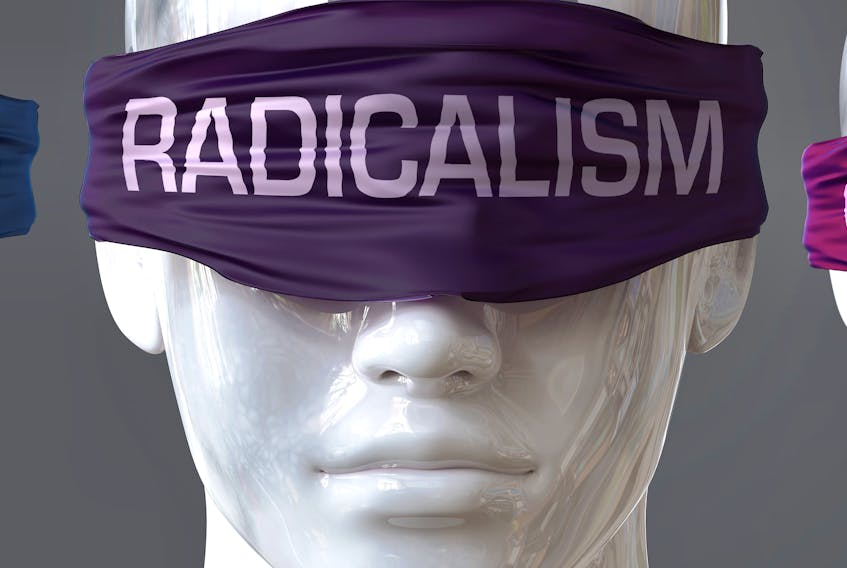The Royal Canadian Mounted Police defines radicalization as “the process by which individuals — usually young people — are introduced to an overtly ideological message and belief system that encourages movement from moderate, mainstream beliefs towards extreme views. While radical thinking is by no means problematic in itself, it becomes a threat to national security when Canadian citizens or residents espouse or engage in violence or direct action as a means of promoting political, ideological or religious extremism. Sometimes referred to as “homegrown terrorism,” this process of radicalization is more correctly referred to as domestic radicalization leading to terrorist violence.”
The Oxford Dictionary defines it as “the action or process of causing someone to adopt radical positions on political or social issues.”
When I first heard this word used in the context of what is happening in the Not-as-United-as-they-used-to-be-States, a bell went off in my already appalled head. It describes perfectly and chillingly what has happened under the influence of Donald Trump.
In preparation for this column I’ve been researching radicalization. I will focus on the political, and here are my Coles notes.
Two of the influences of radical violence are group grievance and true believers.
In group grievance the subjects believe that serious and unforgivable harm has been inflicted on a group they belong to and this perceived harm causes them to have an ‘us versus them’ mentality. It’s what we commonly call mob mentality and history is full examples of how it lowers inhibitions to violence.
True believers are gradually radicalized through rhetoric or other influences. It’s brainwashing pure and simple. Their views narrow and they gravitate to like-minded people, feeding on each other and becoming more and more fanatical about their beliefs and the need to act. They drink the Kool-Aid.
Trump’s lies have radicalized a frightening large segment of the American people but even worse, he couldn’t have done it by himself. The sheer number of his toady enablers in the Republican Party added to the process.
They exploited and magnified the worst fears and insecurities of people with genuine and imagined grievances, encouraging them to “stand up for themselves and do something about it.”
The experts say that putting out a message of fierce loyalty, total rejection of anyone who opposes, and that something precious was stolen, is the type of indoctrination that results in making followers believe that violence and the taking of life is justified.
That describes Jihadi groups and also describes why, in August of 2020 seventeen year old Kyle Rittenhouse answered a call to arms on extremist conservative social media and shot three people and killed two at a Black Lives Matter rally. After the shootings he walked freely home, past police, with his assault rifle on his chest.
Rittenhouse boasted about sitting in the front row at a rally for Trump. Trump supporters, describing him as a patriot who took up arms to protect people and property, raised enough money to make his $2-million cash bail which he celebrated wearing a T-shirt that said “Free as F..k.”
Different types of radicals have different ideologies but the messaging has the same effect. However it helps in The U.S. if the extremists are white and American born and they know it. Anyone who says that these thugs wouldn’t have been treated any differently if they’d been black or wearing turbans is either lying or certifiable. (It’s worth noting that the National Guard has often been deployed against non-white protestors but weren’t for the Capitol insurrection.)
For those who are reluctant to make comparisons between the home grown extremists that stormed the Capitol and foreign extremist groups like ISIS, experts in de-radicalization say that the psychological foundations between these groups are much the same. These same experts fear it may already be too late to steer clear of what comes next.
Radicalization is by far the most destructive and heinous thing Donald Trump has done. The attack on the Capitol building is the tip of the iceberg.
Janice Wells writes from S. John’s









